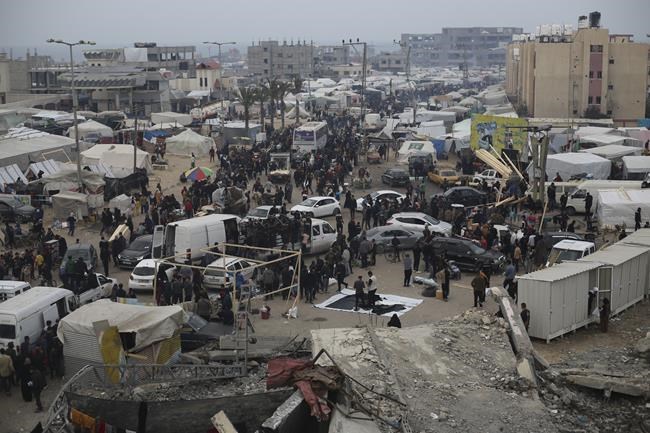Here is a roundup of stories from The Canadian Press designed to bring you up to speed on what you need to know today...
Tens of thousands of Palestinians stream into Rafah as Israel expands its offensive
The Israeli-Hamas war has already driven around 85% of Gaza's 2.3 million people from their homes, leveling the northern part of the territory and heightening fears about a similar fate for the south as Israel's air and ground offensive widened Friday.
Tens of thousands of displaced Palestinians have streamed into the town of Rafah in the southernmost end of Gaza in recent days, according to the United Nations, crowding into an already overwhelmed area of the embattled territory.
More than 20,000 Palestinians, two-thirds of them women and children, have been killed since the start of the war, according to the Health Ministry in Hamas-run Gaza, which doesn't differentiate between civilians and combatants among the dead.
Canada to offer humanitarian visas to those fleeing Sudan if relatives pay costs
Ottawa is offering a lifeline to people fleeing an escalating civil war in Sudan if they have relatives in Canada who agree to financially support them.
Immigration Minister Marc Miller says this new humanitarian pathway is for both Sudanese citizens and other foreign citizens who lived in the northeastern African country when conflict broke out in mid-April.
The program applies to people who are either a child, grandchild, parent, grandparent or sibling to a Canadian citizen or permanent resident.
Those relatives have to agree to financially support them, though Ottawa has not said how much money this will require.
Here's what else we're watching ...
Union representing 40 per cent of Quebec teachers reaches deal, ends unlimited strike
A union representing 40 per cent of Quebec teachers has reached a deal in principle with the government and is ending a strike that has shut around 800 schools since Nov. 23.
Federation autonome de l'enseignement _ or FAE _ said Thursday night on social media that it spent the day analyzing a tentative deal with the province and will recommend it to its members for approval during general assemblies after the holidays. Details of the agreement have not been released.
The union said it has ended all of its pressure tactics, such as the general strike that has shut 800 schools, including in Montreal, since the end of November. If students affected by the FAE strike return to school as scheduled in January, they will have been away from classes for almost seven consecutive weeks.
Two teens dead after falling through ice on the Rideau River in Ottawa
Police in Ottawa have given an update about the four teens who fell through the ice on the Rideau River in the city's south end late Wednesday night.
After confirming that one teenager died, divers found a second body late Thursday.
Two of the teenagers were rescued from the water and taken to hospital.
There have been similar incidents across the country.
RCMP in Alberta confirmed this week that a family of three died after falling through thin ice while riding their UTV in the lead-up to Christmas.
Climate adaptation needs money to save money
The federal government says every dollar spent on climate adaptation saves up to 15 dollars in future costs while generating significant benefits.
But one expert says Ottawa hasn't provided enough planning or funding to get its national adaptation strategy off the ground, despite a devastating summer of wildfires and flooding.
Craig Stewart, vice-president for climate change and federal issues with the Insurance Bureau of Canada, says there's "a lack of political will around adaptation."
Canada's first adaptation strategy released in June outlines time-based targets to reduce risks posed by wildfires, extreme heat, flooding, and a host of other impacts linked to global heating.
Warm weather wreaks havoc with some B.C. ski hills
British Columbia's abnormally warm winter has left local ski resorts grappling with a lack of snow during the holiday tourism season, as resorts struggle to keep runs open.
Fewer than half of Whistler Blackcomb's trails are open, while Vancouver's Mount Seymour is closed entirely while it waits for better conditions.
Warmth related to the El Niño climate phenomenon this week has pushed temperatures to record highs in regions including Metro Vancouver, Greater Victoria, the Sunshine Coast and the Okanagan.
In Whistler, 120 kilometres north of Vancouver, Environment Canada was reporting no snow on the ground on Christmas Day, compared to 40 centimetres last Christmas.
This report by The Canadian Press was first published Dec. 29, 2023.
The Canadian Press




